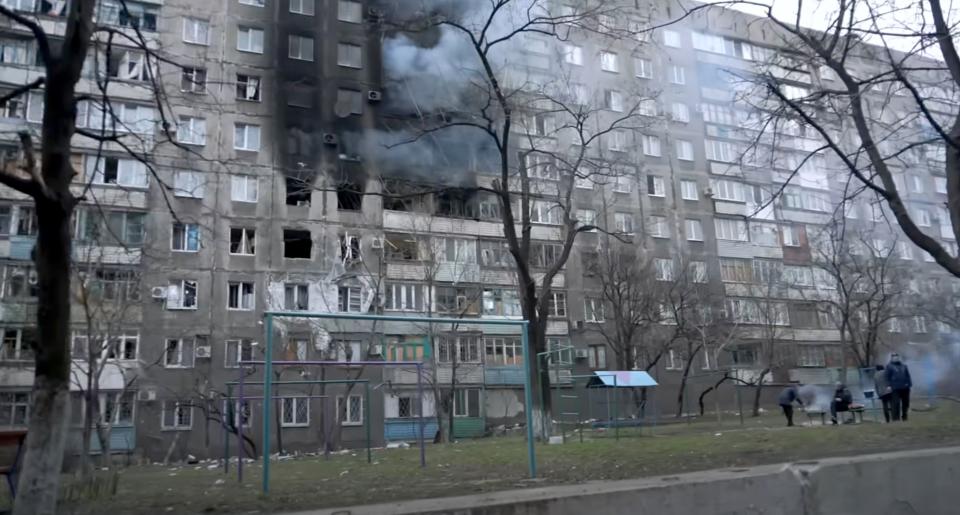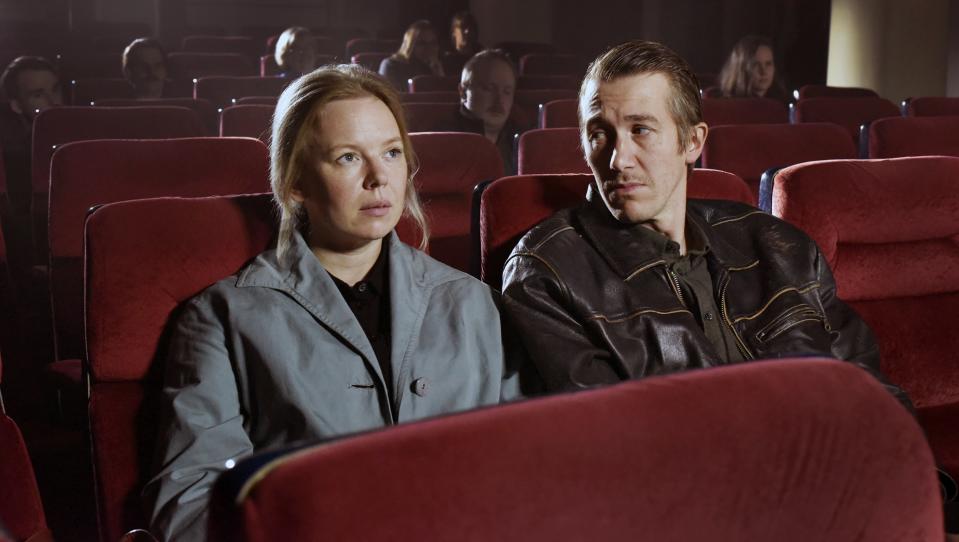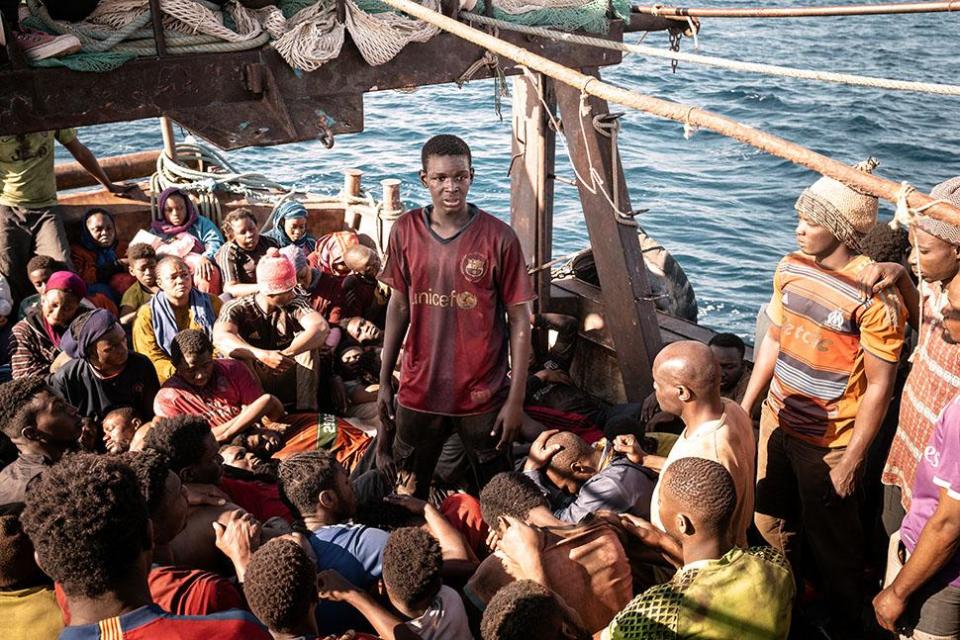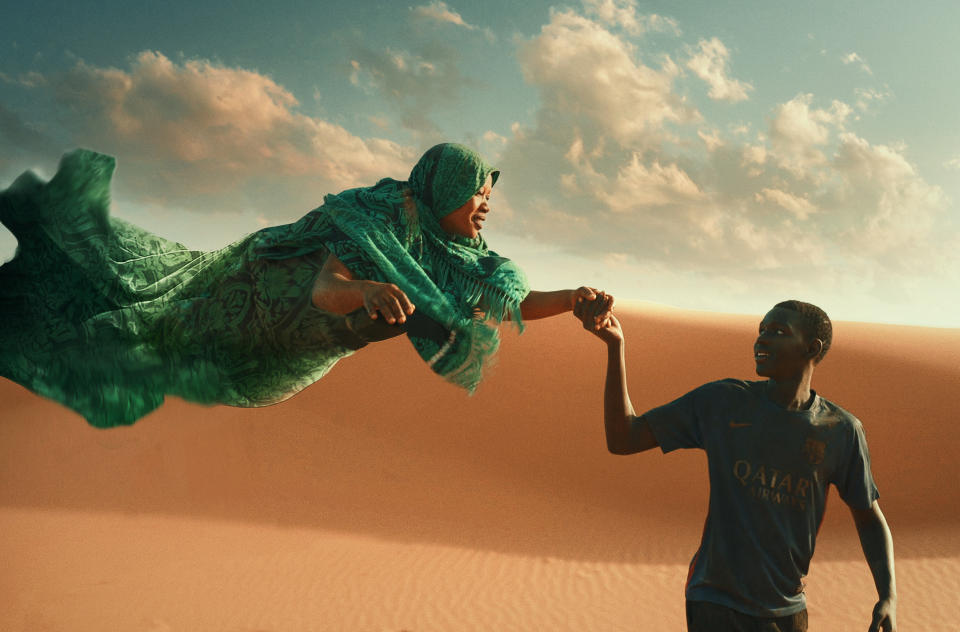Matteo Garrone On ‘Io Capitano,’ One Of 15 International Films Making The Perilous Passage To Oscar Night: “When You Make A Movie Like This, You Have To Accept That It Will Be Tough”
- Oops!Something went wrong.Please try again later.
- Oops!Something went wrong.Please try again later.
- Oops!Something went wrong.Please try again later.
- Oops!Something went wrong.Please try again later.
- Oops!Something went wrong.Please try again later.
- Oops!Something went wrong.Please try again later.
- Oops!Something went wrong.Please try again later.

As awards season switches up a gear, with the handing out of the Golden Globes and the publication of the Bafta shortlists, one major title stands out in the International categories of both: Justine Triet’s Palme d’Or winning courtroom drama Anatomy of a Fall. It would be a reasonable bet for the Oscar win in any year — if it were actually eligible. In lieu of Triet’s film, which fell well within Academy rules in terms of the amount of English spoken, the French selection panel opted instead for period gourmet drama The Taste of Things to do battle for the country’s honor, a move that is sure to cause a lot of confusion in the coming weeks.
Otherwise, the release of the international shortlist came with very few surprises this year, but perhaps chief among them was an unexpected snub for the Palestinian entry Bye Bye Tiberias by Lina Soulem. One might see this a rejection of politics, given the situation in the Middle East, but the list also saw Ukraine make the cut for the very first time, with a film that couldn’t be any more specific to the country’s ongoing war with Russia. Directed by Ukrainian photojournalist and filmmaker Mstyslav Chernov, 20 Days in Mariupol, which premiered at Sundance last year, is a harrowing first-hand documentary account of a Russian attack on a major city and its shocking disregard for civilian life.
More from Deadline
Perhaps reflecting the now frequent overlap between fiction and non-fiction, docs have begun edging into the International category ever more, as evidenced by the inclusion of The Mother of All Lies, from Morocco, and Four Daughters, from Tunisia. Both films stray far from the traditional talking-heads format; in Kaouther Ben Hania’s Four Daughters the director not only uses actors to tell the story of a mother who lost her daughters to ISIS, but has them interact with the film’s real-life subjects. Asmae El Moudir’s The Mother of All Lies, meanwhile, uses figurines and dioramas to open up the director’s grandmother and find out why she refused to allow her family to photograph their lives.

The list makes clear that at least four titles look safe to go through to next round, all of them Cannes favorites: Aki Kaurismäki’s Fallen Leaves (Finland); Wim Wenders’ Perfect Days (Japan); Trần Anh Hùng’s The Taste of Things (France); and Jonathan Glazer’s The Zone of Interest (U.K.); the latter of which may benefit voters faced with an already busy ballot for Best Picture. Spain’s Society of the Snow, helmed by J.A. Bayona, could make the cut too, if the real-life subject matter — a brutal survival story set in the aftermath of a plane crash — doesn’t prove too upsetting, or possibly Nikolaj Arcel’s The Promised Land, if the appeal of Mads Mikkelsen outweighs the dryness of its historical Danish content.
Of the six remaining, it’s an open field, although Armenia’s Amerikatsi, a dark comedy about an Armenian American who returns to find his birth country under Stalin’s brutal rule, might be a little too offbeat in tone. Likewise, Pawo Choyning Dorji may struggle to return to the ceremony after Lunana: A Yak in the Classroom with his more satirical follow-up, The Monk and the Gun, a comedy inspired by the establishment of democracy in his native Bhutan. More serious challengers come from Germany, with Ilker Çatak’s psychological drama The Teachers’ Lounge; Iceland, with Hlynur Pálmason’s religious odyssey Godland, and Mexico, with Lila Avilés’ rites-of-passage story Tótem.

One entry that could make it, however, is a film that tells the story of a journey made against the odds. Starring two Senegalese unknowns, Seydou Sarr and Moustapha Fall, Italy’s Io Capitano, directed by Matteo Garrone, is that rare film that looks behind the headlines and ends where most immigrant dramas start. It’s a surprising move for Garrone, who perhaps remains best known internationally for his hard-hitting 2008 gangster movie Gomorrah, which IFC released in the U.S. with Martin Scorsese’s support.
For Garrone, however, Io Capitano isn’t a change of direction but a return. “My first movie, Terra di mezzo, was about an immigrant,” he says. “That was 27 years ago, so it’s like I’ve come full circle. But the idea this time came from a desire to show what’s behind the journey, what’s behind the image that we’ve been used to seeing, for years, on the news. We always see [statistics] — the numbers of people that arrive, either alive or dead — and we forget that behind these numbers there are people. I wanted to give a visual form to the part of the journey that we do not see, so the film came from a desire to do a kind of reverse shot of what we’re used to seeing. I wanted to put the camera on the other side, to a give a voice to people that usually don’t have one, and to give to the audience the chance to live this experience through the eyes of an immigrant.”
The film tracks a very specific route, from Dakar through Libya, and up to Italy via a perilous sea crossing. There is danger at every turn, something Garrone says came from his extensive research into the subject. “All the immigrants that I spoke to came via that route,” he says. “But I don’t think it’s important [exactly] which route they come through. I just wanted to show an epic journey, an epic adventure. These kids aren’t escaping from a war, they are trying to follow their dreams — they want to write songs — and it’s something that everybody should be able to relate to. They want to move, they want to travel, they want to follow their dreams, they want to live their life. It’s about that: the fact that there are some human beings that can move around freely and others that can’t. They have to pass through hell to follow their dreams.”

The idea of the ‘romantic migrant’ is the backbone of the film, something that comes to the fore in the film’s surprising moments of surreal beauty, notably in the desert, where a dying woman is shown levitating. Garrone is trying to make the point that young people are coming to Africa for the same reason as young Europeans.
“When we see a boat of people arriving in Italy, we assume they are always escaping from war,” he explains. “But I know that is not always the case, because I listen to them. I know that 70% of the population in Africa are young, and a lot of them use social media, they have a window on our world, and what they see from their point of view of our world is something very bright, something full of light, something that makes a lot of promises to them. They don’t see the reality, they only see the surface. So, it’s understandable, it’s only human, that they want to come here. Then, when they arrive, maybe they will discover that it’s not like they think. But they won’t know that until they get here. They just want to come here because they are young, and they don’t understand why other guys the same age can come here on holiday and they can’t.”
The success of the film primarily comes down to the two young boys, how well they sync together, and how frantic the film becomes when circumstances tear them apart. “We did a casting in Senegal, and we saw many young actors, and also non-actors,” Garrone says. “Finally, we found Moustapha, who was studying theater in Dakar, and Seydou who comes from a family of actors. He actually wants to be a soccer player, but he was pushed by the mother and the sister to go to the casting. And I think the strongest part of the movie is the intensity of his performance. The humanity he gives to the character.”

Something Garrone hadn’t quite factored in, however, was the language barrier. “For me, it was really difficult, because I don’t speak Wolof, so I didn’t know what they were going to say. When they were acting, I had an interpreter, and so I usually used to ask the interpreter if they were saying something close to the script or not. But we trusted each other. It helped that [the boys] had their own dreams about moving from Senegal to Europe like the characters, so there was a sort of a wedding between the person and the character. But I didn’t want them to know if their characters would succeed [in getting there] or not until the end. So, we shot chronologically, and we only used to give them the pages of the script that they needed, day by day.”

It’s a testament to Garrone’s shooting style that the finished film looks a lot more dangerous than it actually was, notably in the Libya stretch, where the boys come up against a vicious band of terrorists-slash-pirates. Happily, all that stuff is the magic of the movies. “We never went to Libya, we recreated it in Casablanca,” he says. “We filmed the desert scenes in Morocco. We recreated the boat journey. We worked very, very hard on the research, using real videos, real photos, and we recreated this world with the help of people [who made that journey], because all the extras in the movie are people that, for real, made it. They helped us to work on the details, and also helped the actors to become their characters. It was just an incredible privilege for us all to work together. And also, for them, it was very, very important. They wanted to show the world this experience, what they went through, because very often they are not believed.”
Nevertheless, it was by no means a walk in the park. “It was really tough. But when you make a movie like this, all the things that make the shoot difficult become the soul of the project, so it’s fine. I mean when you make a movie like this, you have to accept that it will be tough, and that every difficulty will bring life to the movie. I like that kind of risk.”
Best of Deadline
TV Cancellations Photo Gallery: Series Ending In 2024 & Beyond
2024 Premiere Dates For New & Returning Series On Broadcast, Cable & Streaming
Hollywood & Media Deaths In 2024: Photo Gallery & Obituaries
Sign up for Deadline's Newsletter. For the latest news, follow us on Facebook, Twitter, and Instagram.

